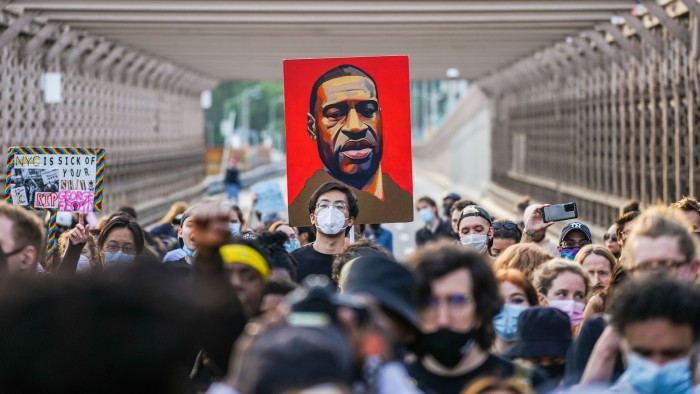Unlock the Editor’s Digest for free
Roula Khalaf, Editor of the FT, selects her favourite stories in this weekly newsletter.
America’s retreat from diversity efforts has left thousands of inclusion specialists worried about their careers. The move endangers the future of a profession that has catapulted women and people of colour to the top ranks of corporations, universities and government in recent years.
One US diversity consultant, who asked that their name be withheld to avoid repercussions for their business, says they lost three contracts within weeks of each other after clients abruptly ended inclusion programmes amid pressure from conservative activists.
The consultant, who specialised for years in reducing workplace sexual harassment, now markets their services as a general human resources consultant. Continuing a career in diversity was akin to “fighting a losing battle . . . Now I just slip ‘DEI’ in whenever I can.”
For now, the downturn seems to be limited to the US, where the so-called “anti-woke” backlash has been fiercest. But European diversity professionals are watching the experiences of their US peers and fear they could be next.
“It might not have impacted me yet, but I’m still mourning my career,” says one London-based inclusion executive, who also declined to be named. “It has been condemned by the most influential country in the world.”
After the 2020 murder of George Floyd by a police officer prompted a racial reckoning in the US, “chief diversity officer” became one of the hottest job titles in the country. Companies rushed to build out programmes aimed at reducing racial and gender discrimination among staff.
But there has been a “significant reduction” in the number of jobs with titles mentioning diversity, equity or inclusion (DEI) since President Donald Trump took office in January, pledging to eliminate “illegal and immoral discrimination programmes,” says Nicole Bachaud, a labour economist at jobs site ZipRecruiter.
The number of people in DEI roles in Russell 3000 companies, an index of the largest publicly-traded US companies, stood at just under 11,000 in August 2025, a drop of 13 per cent from the peak of about 12,400 in July 2022, according to an analysis of public employment records for the Financial Times by workforce intelligence firm Revelio Labs.
One diversity practitioner describes the downturn in the field as a “double whammy” for women and people of colour. Those in DEI roles are more diverse than other parts of the C-suite, per Revelio Labs’ analysis, which also found that companies with such roles are also more likely to have more diversity at every level of their organisation. Nearly 68 per cent of US workers in DEI roles at Russell 3000 companies since 2022 are women, compared to 46 per cent of non-DEI roles, according to the analysis.
But Bachaud says that, to some extent, the downturn in the US DEI sector can be explained by the broader slowdown in employment growth since the start of the year. US non-farm payroll figures have changed little since April, according to the latest official data, published in September.
“There was a big push in the post-pandemic workplace for increased DEI, so seeing job postings waning after that period isn’t much of a shock as the boom in hiring began to slow,” Bachaud adds.
US companies first began adding roles focused on weeding out bias in their operations to help them comply with a wave of civil rights legislation in the 1950s and 1960s. This culminated in the Civil Rights Act of 1964, which banned employment discrimination on the basis of race, colour, religion, sex or national origin.
The work became professionalised in the following decades, with most workers coming into the field through human resources or talent acquisition roles, according to Revelio Labs data.
“This field has historically suffered from a perception that it lacks rigour,” says David Glasgow, an adjunct professor at NYU law school, who also founded the school’s Meltzer Center for Diversity, Inclusion, and Belonging.
That could be why diversity teams were especially hard hit by the 2022 wave of Big Tech lay-offs. The cuts accelerated after conservative activists began attacking corporate diversity efforts over the past year, prompting dozens of US companies to disband their DEI teams.
Meta, for example, folded its DEI team in January and moved its chief diversity officer Maxine Williams into a new role focused on “accessibility and engagement”.
Revelio Labs tracked workers leaving DEI positions and found that the majority took unrelated roles at different companies, while others transitioned into different functions at the same employer. Very few displaced DEI practitioners found the same type of role elsewhere. Advertisements for jobs with DEI in the title have fallen 74 per cent over the past year, according to recruitment website Indeed.
